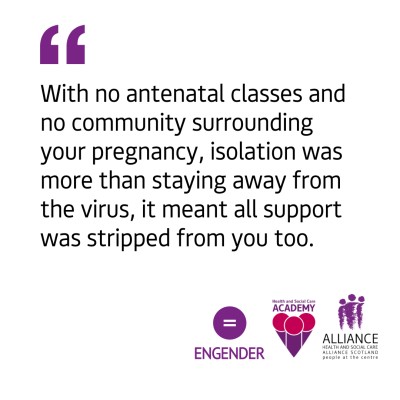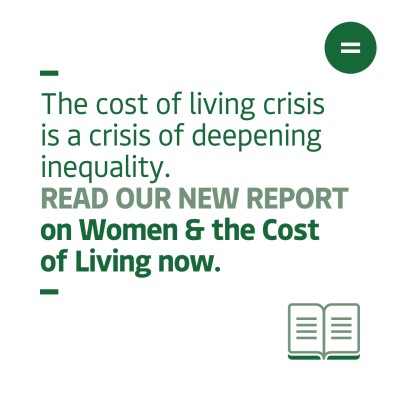Engender blog
All of Engender’s latest news. Reports, reviews, books, articles, and information from across Scotland’s women’s sector.
We would love to hear from other feminists around Scotland. Check out our guidelines for more information on how you can blog for us.
GUEST BLOG: Pregnancy in lockdown: Leaving joy out of it
 We've been working with the ALLIANCE and The Health and Social Care Academy
to gather information about experiences of pregnancy and maternity
services during Covid-19 from women across Scotland. Alongside our work,
we're sharing a series of guest blogs reflecting on those experiences.
Here, Kirsty Kinloch talks about the uncertainty surrounding Covid-19 and pregnancy in 2020.
We've been working with the ALLIANCE and The Health and Social Care Academy
to gather information about experiences of pregnancy and maternity
services during Covid-19 from women across Scotland. Alongside our work,
we're sharing a series of guest blogs reflecting on those experiences.
Here, Kirsty Kinloch talks about the uncertainty surrounding Covid-19 and pregnancy in 2020.
The Coronavirus pandemic, lockdowns and restrictions changed the whole experience for those who were pregnant during 2020 and 2021. It’s an anxious experience in normal times, but add a deadly virus, the removal of your entire support system and healthcare restrictions, and you’ve got a recipe for worry. When I think back over my pregnancy and the early life of my daughter, I am sad to say that the overwhelming feeling is one of disappointment.
Women's and Human Rights organisations restate support for Gender Recognition Reform Bill
Women's and human rights organisations in Scotland, including Engender, have written to the UN Special Rapporteur for Violence Against Women and Girls restating their support for Scotland's Gender Recogntion Reform Bill.
We wrote to Ms Alsalem detailing why they do not share concerns she expressed about the Bill. In our letter we state:
"We see the paths to equality and the realisation of human rights for women and trans people as being deeply interconnected and dependant on shared efforts to dismantle systems of discrimination."
GUEST BLOG: My “unremarkable” pandemic pregnancy

We've been working with the ALLIANCE and The Health and Social Care Academy to gather information about experiences of pregnancy and maternity services during Covid-19 from women across Scotland. Alongside our work, we're sharing a series of guest blogs reflecting on those experiences. Here, Sarah Robinson Galloway looks back on pregnancy in the early stages of the pandemic.
It’s Boxing Day 2019, I’m in my sister-in-law’s bathroom early in the morning doing a pregnancy test. I already knew I was pregnant, despite it only being two or three weeks, this was just to confirm so I wasn’t second-guessing myself. It’s positive, I tell my husband and we’re excited to be on our second pregnancy journey. We weren’t worried, we had done this before and had one beautiful wee girl already.
The cost of living crisis and women: read our new report

Today Engender has released a report setting out how the deepening cost of living crisis will have a devastating impact both on different groups of women in Scotland, and on women's equality as a whole. Covering issues including fuel costs, unpaid care, housing, women's safety, mental health and social security, the report details how marginalised women will be disproportionately affected by this latest cost of living crisis. We make recommendations for immediate action to ensure that Scottish Government policy and budgetary responses to the cost of living do not risk entrenching gender inequality even more deeply in Scotland.
Crisis after Crisis, women pay the price
Women, particularly those facing intersecting marginalisation, pay the price in times of crisis because there is very little safety net when the fault lines of deep inequality in the UK are exposed. This is largely due to of a gendered ‘crisis of incomes’ across the UK that ensures women do not have equal access to financial resources compared with men. The egregious impact of the Covid-19 pandemic has already placed women at greater risk of economic insecurity, and the current cost of living crisis will further exacerbate women’s existing economic inequality, pushing many into poverty.
Higher prices, lower income, less security
While many people across Scotland are experiencing hardship as a result of the cost of living increases, women are far more likely to take responsibility for spending on children and purchasing non-durable items like food and domestic products that are susceptible to price hikes during periods of inflation. Alongside these increased costs, the UK Government decision not to uprate Universal Credit in line with inflation mean that hundreds of thousands of people in Scotland will experience a real terms income cut of £570 per year. Households impacted by the benefits cap face even more severe losses. Women are the majority of those on Universal Credit and impacted by the benefit cap.
Women make up the majority of many groups with high energy needs, including older people, disabled people, unpaid carers, and those looking after children in the home, and are also the majority of those in temporary work and on zero-hours contacts in Scotland. Soaring energy bills for households and business will therefore have a disproportionate impact on women, both as the managers of increasingly tight household budgets, and as those first in line to face unemployment, underemployment or the negative mental health impacts associated with precarious work.
Delivering Equally Safe: The importance of primary prevention

Last year, Engender was awarded funding from the Delivering Equally Safe fund of the Scottish Government, for work on primary prevention of violence against women. We are now at the end of the first year of this funding and our Policy Officer for the Delivering Equally Safe project, Hannah Brisbane, shares an update about the project so far.
As you may know, Equally Safe is Scotland’s strategy to prevent and eradicate violence against women and girls. The strategy uses a feminist analysis of violence against women and girls (VAWG) by recognising it as a cause and consequence of gender inequality.
Downloads
 Engender Briefing: Pension Credit Entitlement Changes
From 15 May 2019, new changes will be introduced which will require couples where one partner has reached state pension age and one has not (‘mixed age couples’) to claim universal credit (UC) instead of Pension Credit.
Engender Briefing: Pension Credit Entitlement Changes
From 15 May 2019, new changes will be introduced which will require couples where one partner has reached state pension age and one has not (‘mixed age couples’) to claim universal credit (UC) instead of Pension Credit.
 Engender Parliamentary Briefing: Condemnation of Misogyny, Racism, Harassment and Sexism
Engender welcomes this Scottish Parliament Debate on Condemnation of Misogyny, Racism, Harassment and Sexism and the opportunity to raise awareness of the ways in which women in Scotland’s inequality contributes to gender-based violence.
Engender Parliamentary Briefing: Condemnation of Misogyny, Racism, Harassment and Sexism
Engender welcomes this Scottish Parliament Debate on Condemnation of Misogyny, Racism, Harassment and Sexism and the opportunity to raise awareness of the ways in which women in Scotland’s inequality contributes to gender-based violence.
 Gender Matters in Social Security: Individual Payments of Universal Credit
A paper calling on the Scottish Government to automatically split payments of Universal Credit between couples, once this power is devolved to the Scottish Parliament.
Gender Matters in Social Security: Individual Payments of Universal Credit
A paper calling on the Scottish Government to automatically split payments of Universal Credit between couples, once this power is devolved to the Scottish Parliament.
 Gender Matters Manifesto: Twenty for 2016
This manifesto sets out measures that, with political will, can be taken over the next parliamentary term in pursuit of these goals.
Gender Matters Manifesto: Twenty for 2016
This manifesto sets out measures that, with political will, can be taken over the next parliamentary term in pursuit of these goals.
 Scottish NGO Briefing for UN Special Rapporteur on Violence Against Women
Joint briefing paper for the UN Rapporteur on Violence Against Women.
Scottish NGO Briefing for UN Special Rapporteur on Violence Against Women
Joint briefing paper for the UN Rapporteur on Violence Against Women.

Newsletter
Sign up to receive our newsletter here:
Sign up to our mailing list
Receive key feminist updates direct to your inbox: